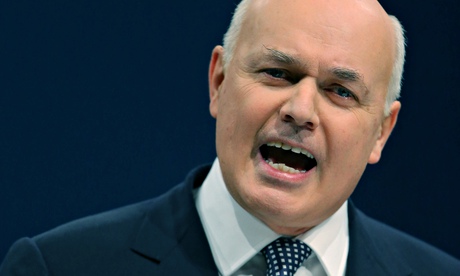Universal Credit, once trailed as the Conservatives’ flagship benefit reform, has staggered from crisis to crisis since its inception seven years ago. On Thursday a letter from a dozen Tory backbenchers to the work and pensions secretary, David Gauke, calling for a pause was leaked to the Daily Telegraph. Later, the former government adviser Dame Louise Casey added her voice, warning that to go ahead with so many problems unresolved would be like jumping off a cliff.
On the brink of a major acceleration in a programme intended to bring together six benefits into a single monthly payment under the banner of making work pay, this is opposition that must be heard.
The underlying idea of integrating benefits into a simpler and more responsive package still has cross-party support. But it is hugely ambitious and at every step it has run into trouble. It was inevitable that the anticipated six-week wait for payments – now being amended – would leave people in desperate circumstances: the most recent of many critical reports, from Citizens Advice, found that one in 10 new claimants waited more than two months for any payment at all. Tens of thousands of people have fallen into rent arrears and it threatens many more.
Across the 105 local authorities where housing benefit is already paid under the new system, the number of tenants in social housing a month behind with their rent has multiplied five times. Nearly a third are two months behind with their rent, six times as many as under the old system. The switch is behind a steep rise in the number of children living in temporary accommodation.
The DWP has tried to improve the system as it was introduced. The rollout has been repeatedly delayed. Yet insensitivity to basic needs has still been evident. The CAB report found that even basic essentials like calls to the helpline were charged at an unaffordable 50p a minute, and delays of 10 minutes were not uncommon. Claimants struggled to come up with the evidence needed, while some, particularly in rural areas, did not have access to a computer for the entirely digitised service.
Most egregious, the rate at which some claimants will lose benefit is set at 63p in the pound. Compare this with the top rate of income tax – 45% on incomes over £150,000 a year – and the unfairness makes a mockery of the prime minister’s declared concern for the just about managing.
Every experience of reform of the benefits system suggests that it cannot be done while implementing cuts. Yet George Osborne’s last budget before his ignominious dismissal gouged £14bn out of the support available to the poorest in society, and his successor Philip Hammond has hardly restored any of that money.
As a result, some families will be an estimated £2,800 worse off: the chair of the work and pensions select committee, Frank Field, has predicted that it will mean the return of real destitution for the first time since the introduction of the welfare state. For many claimants, the debts that build up become inescapable, an invitation to loan sharks.
If she is wise, Theresa May would make the success of universal credit a highly visible test of her commitment to a new style of Conservatism. It is not only that every argument from pragmatism and experience, as well as from basic human decency, argues that the programme should be halted, rethought, and only cautiously resumed. It is also a matter of parliamentary arithmetic, as MPs realise just how damaging and unpopular this will be.
The letter from the backbenchers is enough for a government defeat on a timely opposition amendment. The DUP, which demanded that the threat to means test winter fuel payments was abandoned as a price for their support, is also likely to be concerned about its implications.
His opponents believe that Mr Gauke is listening and that he may be ready to reconsider. To push ahead in the face of such intense and well-founded criticism would be both an act of political self-harm – and a betrayal of the very people Mrs May pledged to help.
- The rate at which which some claimants will lose benefit, originally stated in the article above as 65p in the pound, has in fact been 63p in the pound since the autumn statement, according to the DWP. The text has now been corrected.











